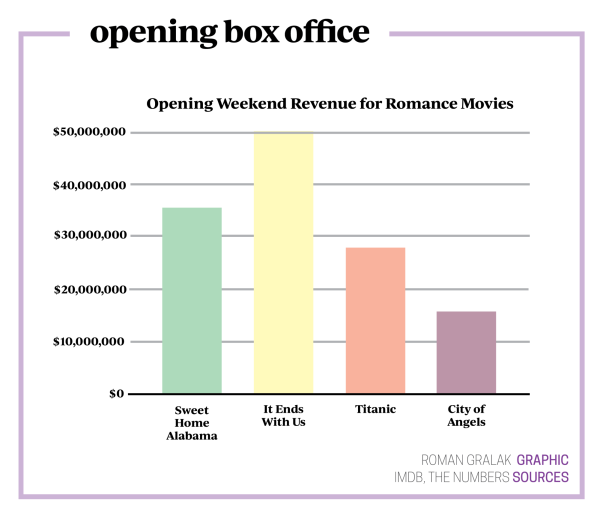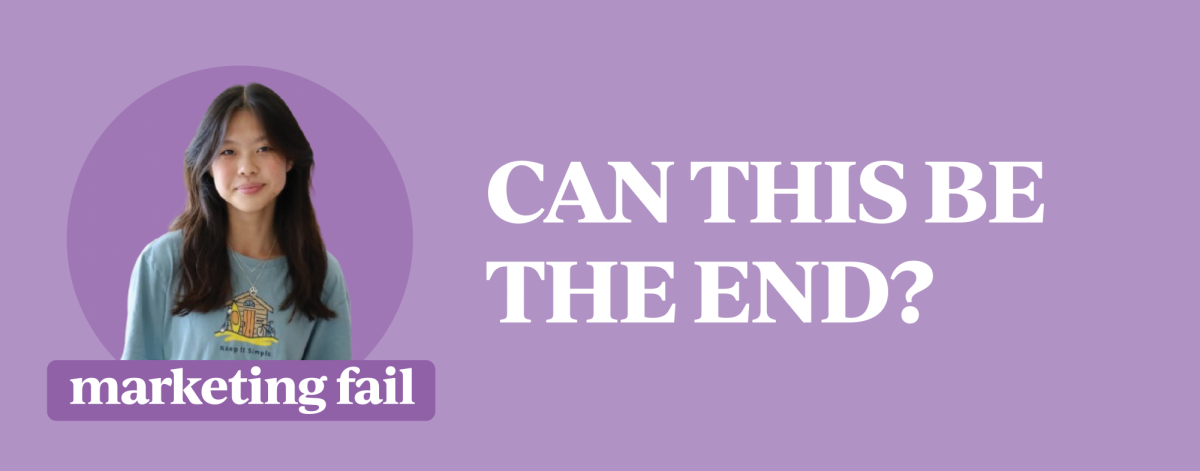This column contains spoilers for the movie “It Ends With Us.”
Colleen Hoover’s “It Ends With Us” originally came out in 2016 but became a cultural phenomenon in 2022, when the novel blew up on BookTok, a side of TikTok that is focused on sharing and reviewing books. Since it became the face of BookTok, “It Ends With Us” has sold over 4 million copies—selling over 2.7 million copies just in 2022— and has been at the top of nearly every best-seller list. The craze was only exacerbated by the announcement of an adapted film based upon the novel which released last month and world premiered in theaters all over the United States, bringing the beloved book back into the spotlight.
The book follows the life of Lily Bloom, a young college graduate who just moved to Boston. She meets Ryle, a neurosurgeon, who just happens to be the brother of her new best friend who she meets in the city. The book follows the typical love-at-first-sight trope (Lily and Ryle literally meet on the rooftop). Throughout the book there are flashbacks to Lily’s previous life in forms of her letters to controversial celebrity Ellen DeGeneres. Lily and Ryle’s relationship takes a drastic turn as Ryle turns out to be domestically abusive, which traps Lily in the same cycle her mom was in with her abusive father. The abuse gets worse as Lily’s first love, Atlas, appears as the owner of a restaurant in Boston, and Ryle gets jealous. The rest of the book follows Lily’s decisions on how to break out of the cycle of abuse and casts Lily in a light that represents many of real domestic abuse victims, especially since Lily is pregnant with Ryle’s baby.

As popular items tend to be, “It Ends With Us” holds a boatload of controversy. The book follows a sensitive theme of domestic abuse and holds a strong message for victims and survivors of violence, but the author, Colleen Hoover, and the star actors in the adapted film, Blake Lively and Justin Baldoni, have been at the receiving end of increasing scrutiny and criticism in their handling of the subject. As her book becomes more popular, Hoover has attempted to find new ways to promote “It Ends With Us”, including a coloring book. This was one of the most controversial moves since it seemed like Hoover was trivializing the heavy content of the book by making it into a coloring book for children, which definitely isn’t the smartest move to market a domestic violence book. After all, it’s easier for kids to be coloring dinosaurs and flowers, not Ryle throwing Lily off the stairs.
The controversy never seemed to end, especially with the new film. Right off the bat, the same issue arose. Lively specifically marketed the film as a rom-com, so much so that she advertised the premiere using the phrase, “Go put on a floral dress, go out with your girlies and come to the theater.” Throughout the entire process, Lively has not approached advertising the film in a manner that is appropriate to the heavy subject the film entails. There haven’t been any disclaimers of the abuse portrayed in the film and no trigger warnings. Lively acting like the film was just a cute rom-com made the situation 10 times more confusing. TikTokers took on Lively’s platform to remark about how accurately the domestic violence was portrayed. But where were the disclaimers that it was in fact, not the light rom-com Lively was promoting it to be? The controversy has been rampant throughout TikTok. Fans have been criticizing Lively for advertising her new hair line, her floral dresses and her husband’s new Marvel movie rather than focusing on the more important matter at hand: the fact that this film was supposed to represent and raise awareness for domestic violence. In contrast, Lively’s co-star, Justin Baldoni, has made it abundantly more clear that the film is made for domestic violence victims and survivors. He has made efforts to involve domestic violence nonprofits with the production of the film.
Heavy subjects like domestic violence in “It Ends With Us” are always hard to handle and especially hard to advertise and promote. There’s a fine line between appropriate advertising and simply not being sensitive enough to the subject at hand. Unfortunately, “It Ends With Us” has never been able to find that proper boundary, and it seems like the people are the problem. It may not be the end for “It Ends With Us,” but it may be the end for Blake Lively.
The views in this column do not necessarily reflect the views of the HiLite staff. Reach Jasmine Zhang at jzhang@hilite.org.
















































































![Review: “The Immortal Soul Salvage Yard:” A criminally underrated poetry collection [MUSE]](https://hilite.org/wp-content/uploads/2025/03/71cju6TvqmL._AC_UF10001000_QL80_.jpg)
![Review: "Dog Man" is Unapologetically Chaotic [MUSE]](https://hilite.org/wp-content/uploads/2025/03/dogman-1200x700.jpg)
![Review: "Ne Zha 2": The WeChat family reunion I didn’t know I needed [MUSE]](https://hilite.org/wp-content/uploads/2025/03/unnamed-4.png)
![Review in Print: Maripaz Villar brings a delightfully unique style to the world of WEBTOON [MUSE]](https://hilite.org/wp-content/uploads/2023/12/maripazcover-1200x960.jpg)
![Review: “The Sword of Kaigen” is a masterpiece [MUSE]](https://hilite.org/wp-content/uploads/2023/11/Screenshot-2023-11-26-201051.png)
![Review: Gateron Oil Kings, great linear switches, okay price [MUSE]](https://hilite.org/wp-content/uploads/2023/11/Screenshot-2023-11-26-200553.png)
![Review: “A Haunting in Venice” is a significant improvement from other Agatha Christie adaptations [MUSE]](https://hilite.org/wp-content/uploads/2023/11/e7ee2938a6d422669771bce6d8088521.jpg)
![Review: A Thanksgiving story from elementary school, still just as interesting [MUSE]](https://hilite.org/wp-content/uploads/2023/11/Screenshot-2023-11-26-195514-987x1200.png)
![Review: "When I Fly Towards You", cute, uplifting youth drama [MUSE]](https://hilite.org/wp-content/uploads/2023/09/When-I-Fly-Towards-You-Chinese-drama.png)
![Postcards from Muse: Hawaii Travel Diary [MUSE]](https://hilite.org/wp-content/uploads/2023/09/My-project-1-1200x1200.jpg)
![Review: "Ladybug & Cat Noir: The Movie," departure from original show [MUSE]](https://hilite.org/wp-content/uploads/2023/09/Ladybug__Cat_Noir_-_The_Movie_poster.jpg)
![Review in Print: "Hidden Love" is the cute, uplifting drama everyone needs [MUSE]](https://hilite.org/wp-content/uploads/2023/09/hiddenlovecover-e1693597208225-1030x1200.png)
![Review in Print: "Heartstopper" is the heartwarming queer romance we all need [MUSE]](https://hilite.org/wp-content/uploads/2023/08/museheartstoppercover-1200x654.png)




